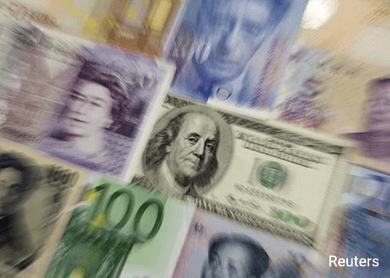
SYDNEY (Nov 11): The euro nursed broad losses early on Wednesday as political uncertainty in Portugal provided an excuse to sell in a market already bracing for further monetary policy easing from the European Central Bank.
The common currency last stood at US$1.0758, recovering after having slid below US$1.0700 for the first time in over six months overnight. On Tuesday, it fell as far as US$1.0674 after breaking below Friday's trough of US$1.0704 .
Investors took aim at the euro after Portugal's minority government collapsed as left-wing parties ousted the ruling centre-right. It was the first such move against an elected government since the end of dictatorship in 1974.
"While political uncertainty in Portugal does not bode well for the euro, a Greece-like scenario is not in the cards. Portugal's fiscal backdrop is much more manageable than Greece's," said Elias Haddad, senor currency strategist at Commonwealth Bank.
"Rather, expectations of more ECB easing will continue to keep the euro under downside pressure."
In contrast, expectations that the Federal Reserve will hike U.S. interest rates in December for the first time in nearly a decade were keeping the greenback underpinned.
With the euro under pressure, the dollar index broke back above its post-payrolls high of 99.345 to scale a fresh seven-month peak of 99.504.
In Asia, the greenback stepped back a bit with the dollar index at 98.882, but traders said there was still underlying support for the U.S. currency.
"Markets have already concluded that the Fed will raise rates in December and I don't think the big picture has changed. I expect the dollar to strengthen further a bit towards the Fed's policy meeting (on Dec 15-16)," said a trader at a Japanese bank.
Against the yen, the greenback fetched 122.82, easing from a 2-1/2 month peak of 123.60 set on Monday. The euro was left flirting with 132.11, having come within a whisker of a six-month trough of 131.45 plumbed on Friday.
Commodity currencies went nowhere with both the Australian and New Zealand dollars holding near one-month lows as investors waited for another batch of economic data out of China.
Following subdued inflation data on Tuesday, the risk is that Chinese industrial output and retail sales will also disappoint.
The Aussie was at US$0.7056, while its kiwi peer was at US$0.6568, both were not far from their one-month lows of US$0.7016 and US$0.6499 respectively.
Traders said the Chinese figures will be the main focus on the global stage with little else out of Europe and the United States, which is observing Veterans Day — a partial markets holiday.